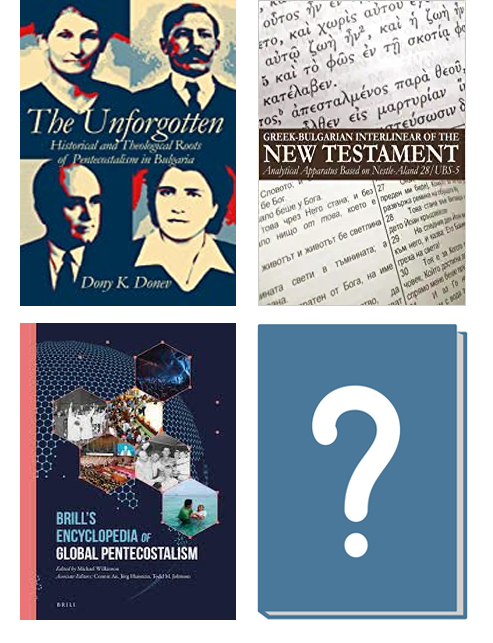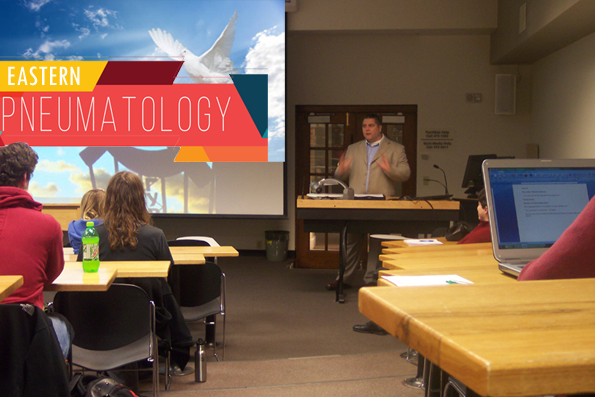13 Titles and Resources at Flower Pentecostal Heritage Center
April 30, 2023 by Cup&Cross
Filed under Featured, News, Publication, Research

25 Years ago, I left D.C. and Never Looked Back…

Spiritual Fullness (Fullness in the Spirit) among Early Bulgarian Pentecostals and Today

Bulgaria’s early Pentecostals insisted on a spiritual fullness that included: (1) salvation, (2) water baptism and (3) baptism with the Spirit.[1] As a formula of spiritual experience, it satisfied the witness of blood, water and Spirit (1 Jn. 5:8) on earth; but also corresponded with the triune God in heaven (1 Jn. 5:7), from whom the believer’s spiritual experience originated. Many conservative Pentecostals in Bulgaria today still uphold “the fullness” teaching and would not use Bibles that exclude Johannine Comma (1 John 5:7) for these three “bear record in heaven.”[2]
However, even with the already present Trinitarian experience of the believer and the enormous theological Methodist influence, it is astounding that the doctrine of sanctification was not taught as a separate work of grace among Bulgarian Protestants. Even when after Pentecostalism spread in Bulgaria, it was not included in the tri-fold formula for “spiritual fullness” of the believer. During the persecution of the Communist Regime, speaking in tongues during Communion was done as a spiritual confirmation that the person has “fullness in the Spirit” or is not a government agent sent by the police to spy on the rest of the church. Interpretation often followed to confirm the spiritual stand of the believer. Early Bulgarian Pentecostals did not distinguish between the initial evidence and the gift of speaking in tongues. Even communist propaganda author Boncho Assenov, who categorized Pentecostals as a sectarian cult, defined this fullness as fundamental for the sacramental theology of the early charismatic communities in Bulgaria.[3]
[1] Mollov, 209.
[2] Zarev, 28.
[3] Boncho Asenov, Religiite i sektite v Bŭlgariia (Sofia: Partizdat, 1968), 167, 367.
See also:
The Practice of Corporate Holiness within the Communion Service of Bulgarian Pentecostals
Sanctification and Personal Holiness among Early Bulgarian Pentecostals
Water Baptism among early Bulgarian Pentecostals
First Pentecostal Missionaries to Bulgaria (1920)
How to Detect a Pedophile: Characteristics, Mannerisms and Personality in 2023
By Kathryn N. Donev, LPC/MSHP, NBCC.
Pedophilia is a medically diagnosable disorder typically “defined as a psychiatric disorder in adults or late adolescents (persons age 16 and older) characterized by a primary or exclusive sexual interest in prepubescent children (generally age 13 years or younger, though onset of puberty may vary)”(Wikipedia). It is a disorder that does not discriminate by race, class or age. The Department of Justice estimates, approximately 400,000 convicted pedophiles currently reside in the United States (Snyder). The following will attempt to present a profile of a pedophile in order to make aware their tactics and typical personality traits used as part of a strategy to take advantage of innocent children.
SOCIALLY CHALLENGED
According to the American Psychiatric Association the overwhelming majority of pedophiles are male. They are typically more religious than not and over the age of 30 (Montaldo, Ruggles). Researcher reports a correlation between pedophilia and certain psychological characteristics, such as poor social skills (Emmers-Sommer). Pedophiles are typically antisocial with few friends and not in a relationship. If in a relationship, they will more likely be in a superficial one with a person whom has a child of their preferred age range whom they can target. If married, the relationship is more “companion” based with no sexual relations and is typically dysfunctional providing only a façade to their real identity (Montaldo).
INTROVERTED CHARACTER
Being an introvert, they will prefer to keep personal information limited. They are often vague about past history. If closed off to real intimate relationships then they do not have to share their real identity from which they are hiding. This achieved goal of avoidance is considered a great personal accomplishment and is one of the ways they compensate for low self-esteem. However, they will present such an overwhelming caring personality that purposes to form “intimate” bonds in which they will invest in listening to the lives of those around them. This bond will appear so real that one overlooks that there is no reciprocity of sharing and in reality you know nothing to very little about the pedophile with whom you feel close.
DEMONSTRATIVE PERSONALITY
Pedophiles may also demonstrate increased personal affection. You may observe that this type of person is “a hugger” or will constantly enter ones personal space and do so at times without invitation. This characteristic is accepted as a personality trait and innocently overlooked and excused. After time, one begins to subconsciously let their guard down as systematically the pedophile becomes closer to you and your loved ones entering an intimate realm. They also may attempt to exaggerate situations to test the limits of an individuals understanding. For example if another protests the initial reaction or exaggeration presented by the pedophile then this information give an insight to ones awareness level and how easily they may be manipulated.
PROFESSIONAL MANIPULATORS
Even though some studies show that a pedophile has lower intellectual abilities and self-esteem (Marshall) they are skillful professional manipulators. They are so successful they are able to present a non-unlikeable persona. Meaning they are overly friendly and engaging to the point where one finds themselves in a relationship without even making a conscious effort. Their personality is so magnetic that it attracts children and adults alike. One allows themselves to continue with such relationship due to the appearances of trustworthiness and respectability presented by the pedophile. They are people who are in good standing in the community and will find themselves in a position of helping such as coaching, ministry leaders, volunteers, and so forth (Ruggles, Wooden).
PROTECTOR ROLE
Child molesters often make efforts to gain access to or authority over children (Wooden). Because the internal desire of a pedophile is for a child to become a possession, a child is the focus of great destructive obsession. A child is the focal point of the world of a pedophile and may often be referenced in terms which are drastically uplifting or angelic such as innocent, heavenly or divine (Montaldo). This strong child advocacy is often viewed as an innocent protective act and is one of the reasons why they are allowed to get close to children. You may also overlook all of the physical affection or photographs taken of a child because this is done in a manner which is portrayed as a service to children across the board. If a pedophile does take pictures in the open, others will be convinced that such are not for personal use but for the greater good perhaps being published in a child advocacy resource or so forth.
CHILDLIKE GESTICULATION
A pedophile, even though they charm their way into the lives of adults by trade, they prefer to be around children more so feeling more comfortable and understood. They surround themselves with items that will make them more appealing to children perhaps even including the way they dress. Some even control the way they talk and prefer to use a soft, slow, gentle, childlike, and more so feminine voice over a strong, threatening, controlling manly voice. They obsessively prefer childlike activities over adult ones. They may test the acceptance level of playing children’s’ games with children by first attempting to see if adults like to play such games as well.
UNDERDOG MENTALITY
It is true that some pedophiles are highly intellectual. Yet they will use any intellectual difficulty or perceived difficulty to their advantage and enjoy being the “underdog”. This allows them to reach out to even the most unaware unknowledgeable person for help with everyday tasks. It is a part of human nature to help those in need and a pedophile will use this to their advantage. This is how they get their foot in the door in order to silently but skillfully creep into your community, social network and ultimately your personal home. You may see this characteristic demonstrated in the constant reminder that they are from a different town and are not familiar with the local culture or area. Or they may obsessively seek your guidance, assistance or approval for even the smallest of tasks. They play off of ones need to be needed.
EPILOGUE
Remember pedophiles are professional manipulators and you will have to make a conscious effort to see through the sophisticated front which they have learned to master. Keep in mind that you should always trust your internal instincts. This is one area in which a pedophile has no advantage over you. Do not attempt to convince yourself that what you are sensing is not real for it is when you fall into this trap that you begin to slowly lose touch with reality and are bewildered and sucked into a lie one which is too dangerous to ignore. Never be afraid by the lies that I will hurt ones feelings if I make aware my observations or I am being too pushy by trying to get more history on a person who is so closed off. When all of the signs are present it is our responsibility as true child advocates to protect our children at any cost.
2011. Copyright. All Rights Reserved by Author and CCMI Consortium. Not to be reproduced in any manner without permission of author or CCMI.
Works Cited
American Psychiatric Association. Fact sheet: pedophilia. Available at:www.medem.com/index.cfm. Accessed March 01, 2011.
Emmers-Sommer, T. M., Allen, M., Bourhis, J., Sahlstein, E., Laskowski, K., Falato, W. L., et al. A meta-analysis of the relationship between social skills and sexual offenders. 2004. Communication Reports, 1–17.
Marshall, W. L. The relationship between self-esteem and deviant sexual arousal in nonfamilial child molesters. 1997. Queens University. Sage Journal Publication of Behavior Modification.
Montaldo, Charles. Profile of a pedophile. Available at: www.about.com. Accessed March 17, 2011.
Ruggles, Tammy L. Profile of a pedophile. Available at www.mentalhealthmatterss.com. February 2009. Last Updated on Tuesday, 28 September 2010 15:46. Accessed March 5, 2011.
Snyder, Howard N. Sexual Assault of Young Children as Reported to Law Enforcement: Victim, Incident, and Offender Characteristics. Washington, DC: US Department of Justice, Bureau of Justice Statistics; 2000. Publication NCJ 182990.
Wikipedia. Article: pedophilia. Available at www.wikipedia.org. Accessed March 15, 2011.
Wooden, Ken, (with Rosemary Webb & Jennifer Mitchell). Think First & Stay Safe™ Parent Guide. A profile of the child molester. 2010. Publication Child Lures Prevention/Teen Lures Prevention.
Orthodoxy and Wesleyan Scriptural Understanding and Practice
“I sit down alone: only God is here; in His presence
I open and read this book to find the way to heaven”
– John Wesley
Our search for the theological and practical connection between Pentecostalism and Eastern Orthodoxy continues with yet another publication by St. Vladimir’s Press titled, Orthodox and Wesleyan Scriptural Understanding and Practice. The book represents an ongoing dialogue between the Orthodox and Wesleyan confessions and it emphasizes how theologians from both sides are attempting to discover commonalities in theology and praxis. To come together, not so much as theologians and thinkers, but as practical doers motivated by the proper interpretation of Scripture. As observed from the title, as well as through the text, these similarities are not necessarily in theological convictions, but in the proceeding Biblical approach toward interpretation of Scripture.
Orthodox and Wesleyan Scriptural Understanding and Practice is a compilation of essays from the Second Consultation on Orthodox and Wesleyan Spirituality under the editorship in 2000 of S.T. Kimbrough, Jr., who contributed the chapter on Charles Wesley’s’ Lyrical Commentary on the Holy Scriptures. I must issue the caution that the book is not an easy read. But it is by no means a book to be easily passed by Pentecostal scholars searching for the Biblical roots of Pentecostalism within the Eastern Orthodoxy.
The book begins with an interesting observation of the exegesis of the Cappadocian Fathers by John A. McGuckin, and continues with an article on the spiritual cognition of my personal favorite, Simeon the New Theologian by Theodore Stylianopoulos. Although the discussion on Gregory the Theologian, Basil of Caesarea and Gregory of Nyssa was thoughtful and presented in an interesting manner, the essay on St. Simeon struck me as well structured, but somewhat shallow.
An interesting approach was taken in Tamara Grdzelidze’s essay where she presented an orthodox perspective of the Wesleyan position on authority of scriptural interpretation. The essay had a very strong exposition in regard to the Wesleyan understanding of the importance of Scripture in Christian living. The latter part, which dealt with the influence of tradition, however was not investigated to its full capacity, which left the text (perhaps on purpose) open to multiple interpretations. Nevertheless, this issue was resolved later in the book by Ted Campbell that dealt with the subject from the Wesleyan perspective.
A central theme throughout the book was the comparison of prayers and song lyrics from both camps. Although I am no musical expert, I must agree with the authors when they say that theology in music has played an important role in both Orthodox and Wesleyan traditions. Music continues to be important in the everyday spiritual experience of the Pentecostal believer. This rather practical approach seemed to be the heart of the discussion where both sides could agree.
Finally, the role of the Holy Spirit is viewed as central for the reading, understanding and practicing of Scripture in both the Orthodox and Wesleyan traditions. For the Pentecostal reader, it may be easy to accept this presumption as similar to the Pentecostal experience, yet the book describes it in terms which will be somewhat foreign to many Pentecostals. Similarities between these interpretations of Scripture may be self-explanatory for the western Pentecostal reader. But due to the ever-present tension between Orthodox and Protestant denominations, those in an Eastern European context may disregard these similarities. But even if the Pentecostal scholar gathers nothing else from this book, they must recognize that the time has come for a formal Orthodox-Pentecostal dialogue, like the one which the World Council of Churches has been trying to put together since 1991.
Departures from Orthodoxy and Ministry Implications

Dony K. Donev, D.Min.: Eastern Pneumotology Lectures
Eastern Orthodoxy can be expressed in one word: theism. The purpose and meaning of life is to become more like God. Deification is pursued by all means of human existence. This quest for divine likeness often includes the typical for the Eastern Church, speculation on the divinity and humanity of Christ, traditions on the doctrine of the Trinity and non-traditional mystical experiences. They appear in the context of both physical and spiritual characteristics in individual and corporate ecclesiastical environment. The role of the Spirit in the process of deification is threefold and involves: creation, re-creation and theism. Eastern Pneumotology follows the graduate process of theism development. The Spirit is involved in the original creation of the world as well as the new-birth experience. His work however, does not end there, but continues throughout the process of personal deification of the believer.
Departures from Orthodoxy
And thus, we arrive at the point of departure from Orthodoxy. Similar to Eastern Pneumotology, this departure can be expressed in one word, dualism. A prime example of the dualistic heresy is the Messalian movement. Arising around AD 360 in Edessa, the Messalians are described as polytheistic. They believe that every human creature has a personal demon, and that Satan and the Holy Spirit together can dwell in the individual. The believers receive a share of the divine Spirit and become equal to God in their incapability to sin.[1] Interesting enough, the Messalians are highly feministic allowing their women to the top of the ecclesiastical hierarchy.
A similar movement arises under the name Paulicians. Due to the mass persecution through which the Paulicians go, the preserved documents about their existence in history are limited. We do know that they appeared in Armenia and the Byzantium Empire. The final trace of Eastern dualism is in on the Balkans, and more particular in Bulgaria under the name Bogomils. 18[2]
Ministry Implications
The next three brief ministerial applications are inspired and drown from the above research on the experiences of the Oriental Orthodox. They are taken in chronological order in its direct context of Pentecostal practices.
- Prayer is the constantly present element through which pneumatic and mystical experiences in the East are obtained. For example, Pallamas reports that the gifts of the Spirit are obtained only through intense mental prayer, which is often accompanied with tears. [3] In the same charismatic context Cassian concludes that after a season the gifts will disappear. My personal implication is that this is precisely the season when prayer and have become strange to the church, and when tears have become are sign of weekends rather than a sign of humility in the presence of the Almighty God. Unfortunately, at the end of the twentieth century, this is precisely our general present satiation.
- Peace of Heart: Hazzaya gives five practical signs for recognition of the works of the Holy Spirit: (1) love of God burns within the heart of the believer, (2) growth in humility of the soul, (3) kindness to all people, (4) true love and (5) vision of mind. His main tool to recognize demons and demonic visions from God and divine revelations is the peace of heart, which follows the heavenly presence.[4] I am persuaded that today the rule of the peace of heart is still true in the hearing of the voice of God.
- Return, reclaim and preservation: The Armenian faith practices focus on preservation of the apostolic doctrines and habits.[5] Symeon the New Theologian also calls for a return to a radical living of the Gospel.[6] In a similar way, the early Church of God claimed to have as a main goal the reclaiming of the power of Pentecost; however, the church today has evolved to a structure that is quite far from this former idea. Furthermore, in this process the church has become too distinguished, replacing the primitivism of the Pentecostal experience with higher education, development programs, sophisticated structures, etc. And while a century ago we were the persecuted and ridiculed, now we are the people who reject and mock churches that carry the Pentecostal primitivism. Through this, we not only deny our historical relationship with them, but also abolish our Pentecostal heritage, which we often like to brag about.
Nevertheless, similar to the early Pentecostal movement, revival will not come to our churches through sophisticated worship liturgies, but rather through a genuine return to the initial Pentecostal experience. At the end of the twentieth century, simply reclaiming the power of Pentecostal is not sufficient. We need to preserve the Pentecostal primitivism in the reality of our present ecclesiastical setting. Only then we will be who we claim that we are.
[1] John of Damascus, De Haeresibus Compendio, 80, PS 3/1:col. clxxvi.
[2] Steven Runciman, The Medieval Manichee: A Study of the Christian Dualistic Heresy (Cambridge University Press, 1974), chapters 2, 4, and 5.
[3] Burgess, 52-53.
[4] Ibid., 173-74.
[5] Ibid., 113.
[6] Ibid., 62.
13 Titles and Resources at Flower Pentecostal Heritage Center
June 30, 2022 by Cup&Cross
Filed under Featured, News, Publication, Research

Spiritual Fullness (Fullness in the Spirit) among Early Bulgarian Pentecostals and Today

Bulgaria’s early Pentecostals insisted on a spiritual fullness that included: (1) salvation, (2) water baptism and (3) baptism with the Spirit.[1] As a formula of spiritual experience, it satisfied the witness of blood, water and Spirit (1 Jn. 5:8) on earth; but also corresponded with the triune God in heaven (1 Jn. 5:7), from whom the believer’s spiritual experience originated. Many conservative Pentecostals in Bulgaria today still uphold “the fullness” teaching and would not use Bibles that exclude Johannine Comma (1 John 5:7) for these three “bear record in heaven.”[2]
However, even with the already present Trinitarian experience of the believer and the enormous theological Methodist influence, it is astounding that the doctrine of sanctification was not taught as a separate work of grace among Bulgarian Protestants. Even when after Pentecostalism spread in Bulgaria, it was not included in the tri-fold formula for “spiritual fullness” of the believer. During the persecution of the Communist Regime, speaking in tongues during Communion was done as a spiritual confirmation that the person has “fullness in the Spirit” or is not a government agent sent by the police to spy on the rest of the church. Interpretation often followed to confirm the spiritual stand of the believer. Early Bulgarian Pentecostals did not distinguish between the initial evidence and the gift of speaking in tongues. Even communist propaganda author Boncho Assenov, who categorized Pentecostals as a sectarian cult, defined this fullness as fundamental for the sacramental theology of the early charismatic communities in Bulgaria.[3]
[1] Mollov, 209.
[2] Zarev, 28.
[3] Boncho Asenov, Religiite i sektite v Bŭlgariia (Sofia: Partizdat, 1968), 167, 367.
See also:
The Practice of Corporate Holiness within the Communion Service of Bulgarian Pentecostals
Sanctification and Personal Holiness among Early Bulgarian Pentecostals
Water Baptism among early Bulgarian Pentecostals
First Pentecostal Missionaries to Bulgaria (1920)
Pandemic, Green Certificate and War Scares

While most Western Europe is now slowly abandoning the idea of a vaccination Green Certificate for travels, Bulgaria is still firmly using such as a permanent requirement. The improvements from the European Union seem to matter little in our Balkan reality, and our churches here have been forced to deal with this since the Pandemic hit.
As if this is not enough, the war in Ukraine is just too close to ignore. Seems like Bulgaria is now pressed between Ukraine and Macedonia in the European Union, and between Russia and NATO in a more global context and this will continue for the foreseeable future.
We have been praying and fasting in the months past that God’s mercy is upon the people and the ministry. Now, that most of denominational ordeals here seem to have come to a sad end, please continue to remember the people of Bulgaria, our decades long commitment to the work of the Great Commission and the many souls that still need salvation, discipleship and ministry on the Balkans.
PUBLICATIONS and NOTABLE MENTIONS
European Legal Cultures in Transition By Grødeland, Åse B. Miller, William Lockley (p. 522)
European Pentecostalism by William Kay; Anne Dyer. Series: Global Pentecostal and Charismatic Studies (p. 242-43)
Global Temperance and the Balkans: American Missionaries, Swiss Scientists and Bulgarian Socialists, 1870–1940 By Nikolay Kamenov.
Brother Doni[y] Donev always found time to respite from his theological studies in order to instruct me in the factual history of the Protestantism in BULGARIA…
Dave Emmett in his W.F.P. Burton (1886-1971): A Pentecostal Pioneer’s Missional Vision for Congo, 2020 (p. 84 and 315) on Pentecostal Primitivism
Journal of European Baptist Studies: Historiography of Baptists in Russia
Authors: Wardin, Albert of the Baptist Convention’s Historical Library and Archives
“With the help of an American Pentecostal of Bulgarian descent, Dony Donev, and the archives of the Assembly of God in the USA, I have assembled an extensive collection of material on the Voronaev movement.”
Charismatic Reformer, Mystic or Father? The Reception of Symeon the New Theologian by Pentecostal/Charismatic Theologians.
by Lysack, Maxym Faculty of Theology, Saint Paul University
Source: Religions; Jun 2021, Vol. 12 Issue 6, p389
In People of the Spirit : The Assemblies of God By McGee, Gary B.
Ed.: Revised and updated. Springfield, Missouri : Gospel Publishing House. 2014
In Religion and Politics in Post-Socialist Central and Southeastern Europe
Challenges Since 1989 on behalf of the East-West Church and Ministry Report
ALSO Church, State, and Democracy in Expanding Europe
By Lavinia Stan, Lucian Turcescu · 2011-2021
The Politics of Language and Nationalism in Modern Central Europe
By T. Kamusella · 2008
Religion and Politics in Post-Socialist Central and … – Page 284 Sabrina P. Ramet · 2014 ·
im Sinne des bulgarischen Church of God Theologen Dony K. Donev der darin die Bedingung für das (er-)leben ..
Geisterfahrer zwischen Transzendenz und Immanenz – Page 54 Giovanni Maltese · 2013
Church of God Evangel vol. 84 1994
Historical Theology in Brill’s Encyclopedia of Global Pentecostalism
• Voronaev, Ivan Efimovich
• Zaplishny, Dionissy Michailovitch
• Nikolov, Nicholas
• Anna Ladd Bartleman
Recent Biblical Studies for the Pneuma Foundation
• Mission of God Study Bible
• Maxwell Leadership Bible
• Fire Bible
• Spirit Filled Life Bible
• Strange Fire?









